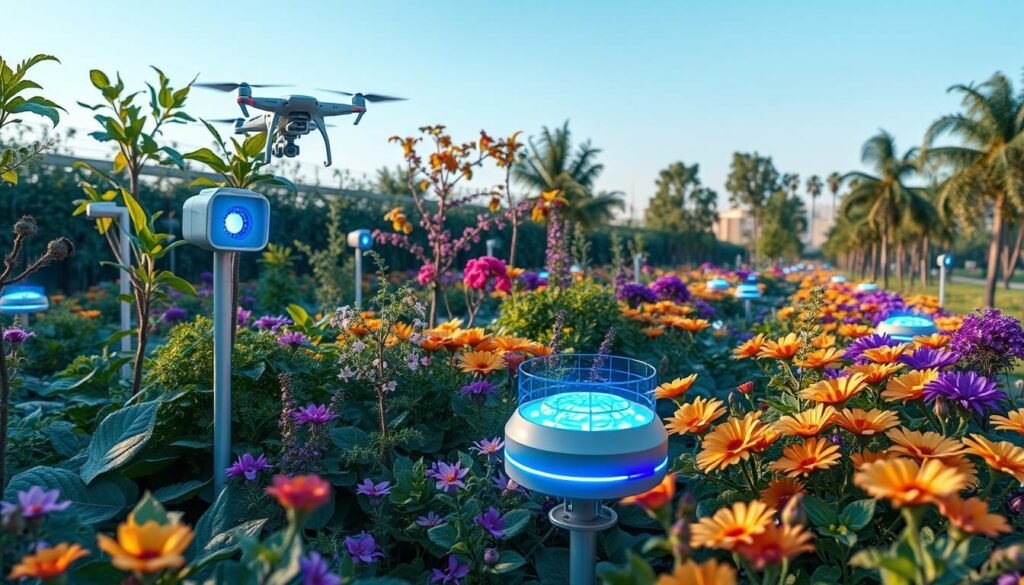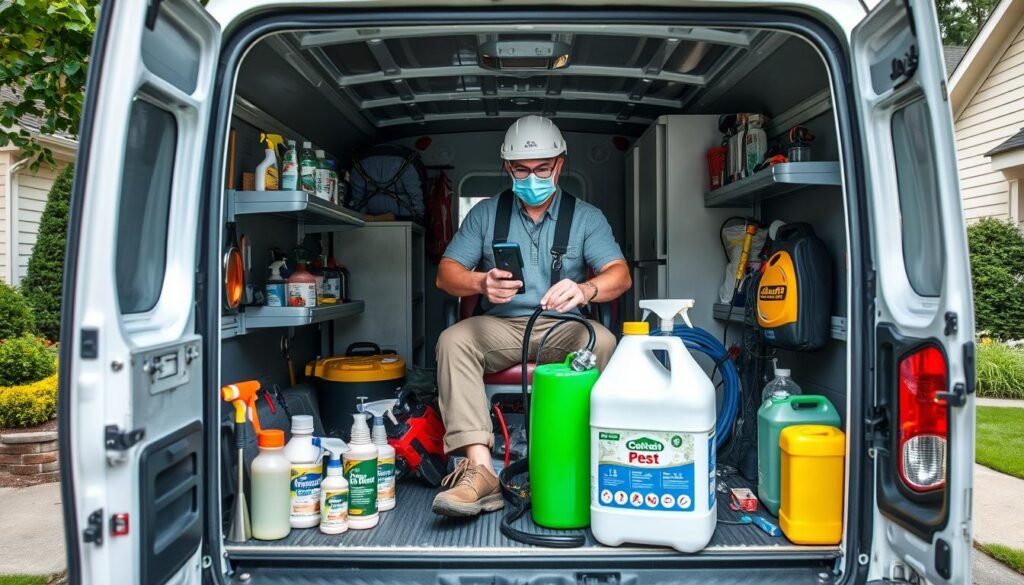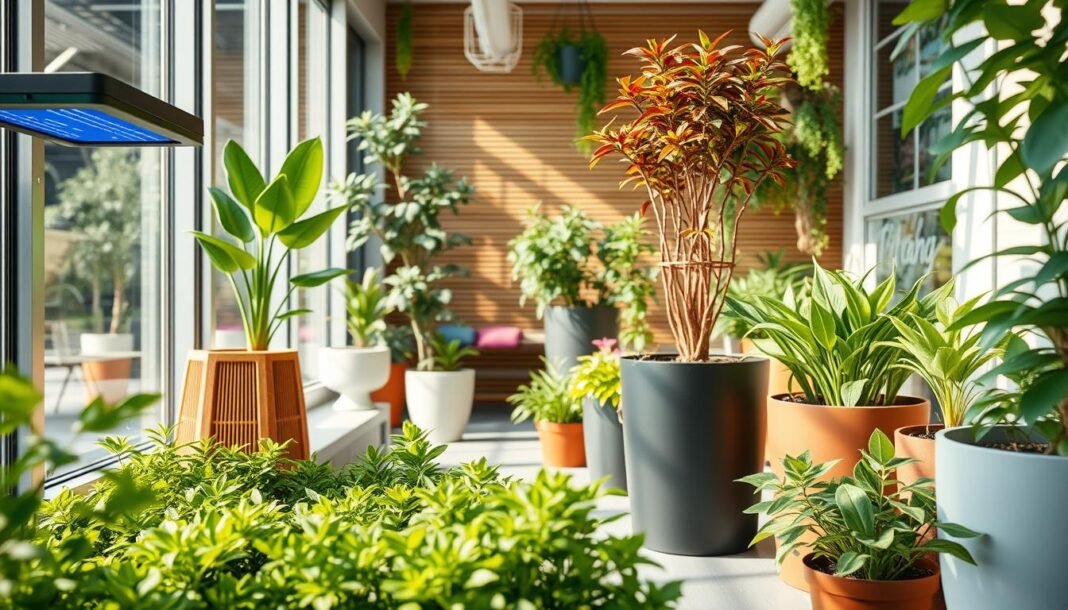As we step into 2024, pest control is moving towards more innovative and eco-friendly ways. There’s a big demand for solutions that work well but are also kind to the environment. This year, we’re looking at new technologies and methods that address today’s pest issues while being eco-friendly.
These advancements aim for effective pest control in 2024. They also support a healthier place for us all to live. It’s about finding smart ways to fight pests without harming our planet.
Key Takeaways
- Understanding the evolution of pest control techniques for 2024.
- Importance of eco-friendly pest management practices.
- Advancements in technology enhancing pest control efficiency.
- Integrating sustainable management strategies in pest solutions.
- Meeting contemporary pest challenges head-on.
Introduction to Pest Control in 2024
The landscape of pest control is evolving rapidly as we move through 2024. With a focus on sustainability, modern pest management is more important than ever. This involves the use of integrated pest management strategies. These strategies aim to control pests effectively while protecting the environment.
This year, the trends in pest control are leaning towards technology. Advanced monitoring systems help professionals detect pests quickly and accurately. This technology improves decision-making, ensuring 除蟲 is safe and efficient.
The importance of understanding local ecosystems is also a key focus in 2024. Using eco-friendly methods and raising community awareness are crucial. The future of pest control is bright, with a balance between technology and sustainability.
| Aspect | 2023 | 2024 |
|---|---|---|
| Focus | Traditional methods | Integrated pest management |
| Technology | Basic monitoring | Advanced pest monitoring systems |
| Environmental Impact | Moderate concern | High priority on sustainability |
| Community Awareness | Limited education | Enhanced public involvement |
Understanding Integrated Pest Management
Integrated pest management (IPM) is a smart way to manage pests. It combines various methods like biological, cultural, and chemical controls. The goal is to manage pests effectively. IPM focuses on understanding pests’ life cycles and behavior. This helps in planning more accurate attacks against pests.
To support sustainable pest control, IPM reduces reliance on pesticides. It looks for alternative solutions and uses multiple strategies. This approach lessens the environmental impact. It supports the trend of using fewer chemicals to protect our ecosystems.
IPM involves keeping an eye on pest populations regularly. This helps in making smart choices about when to act. It ensures that treatments are used only when needed. By doing so, it makes pest control more effective and safer for the environment.
Thanks to integrated pest management, we can solve pest problems today and protect our environment for tomorrow. It’s a thoughtful way to handle pests.
Eco-Friendly Pest Solutions for Sustainable Living
In today’s world, it’s crucial to use eco-friendly pest solutions for sustainability. These methods are non-toxic and protect humans, pets, and helpful wildlife. By using sustainable pest management, we help our ecosystem and communities stay healthy.
Benefits of Eco-Friendly Solutions
Eco-friendly pest solutions come with many benefits:
- They make our homes and gardens safer by reducing toxins.
- Children and pets are safer.
- These solutions are better for the environment, helping all kinds of life thrive.
- Pests are gone without using dangerous chemicals.
Effective Eco-Friendly Products
Here are some non-toxic pest control products that work well and are safe:
| Product | Type | Application |
|---|---|---|
| Diatomaceous Earth | Natural mineral | Sprinkle in areas with pests |
| Essential Oils | Aromatic extracts | Mix with water for sprays |
| Traps | Mechanical devices | Place strategically to capture pests |
Buying from sustainable brands helps the eco-friendly movement grow. Educating buyers about these options ensures a greener future for everyone.
Smart Pest Monitoring Technologies
In 2024, smart pest monitoring technologies are changing the way we fight pests. These systems use the latest tech, mixing the Internet of Things (IoT) with advanced sensors. They can spot pests right away. This gives us the chance to act fast, stopping infestations before they start.
How Smart Monitoring Works
Smart pest monitoring uses connected devices to watch and learn about pest behavior. These devices gather info on pests and the environment. They’re placed in key spots to get the best data. If they find something odd, they quickly send warnings. This means we can deal with pests fast, using less pesticide and improving our approach to pest management.
Popular Smart Solutions in 2024
In 2024, several smart solutions are standing out:
- Smart Traps: These traps keep an eye on pests and let us know when they find something.
- Automated Alerts: These systems warn us about conditions that might attract pests.
- Sensors: These devices check the temperature and humidity, helping us guess when pests might show up.

Digital Pest Control Technologies
The world of pest management is changing thanks to digital tech. These advancements transform how companies control pests. They make the service better and customers happier. At the heart of this change is pest management software. It makes work smoother and helps keep track of pests in real time.
This software lets people plan when to treat areas. It makes sure teams get there fast. This quick response stops pests sooner, keeping everyone safe. Using tech in pest control makes work more accurate. It helps keep track of everything. This is key for a pest-free place and following rules.
Modern digital pest control tech has great parts like:
- Real-time data tracking
- Automated reporting
- Advanced scheduling capabilities
- Route optimization for field staff
Let’s check out some top pest management software used today:
| Software | Key Features | Pricing |
|---|---|---|
| PestRoutes | Scheduling, Route Optimization, Customer Portal | $79/month |
| QADCC | Real-Time Tracking, Automated Reporting | $99/month |
| ServiceTitan | Job Management, Customer Communication, Reporting | $149/month |
Using these new tools makes pest control better. It shows a commitment to using cutting-edge tech. This method tackles today’s issues. It also paves the way for a greener future in pest control.
Predictive Pest Analytics: The Future of Pest Management
Predictive pest analytics is changing how we handle pests. This new way uses environment data and past incidents to predict future problems. This lets us act before pests become a big issue, instead of responding after.
What is Predictive Analytics?
Predictive analytics is all about digging into big data to find patterns. It looks at things like weather and past pest outbreaks. This helps experts guess where and when pests might show up next.
Implementing Predictive Analytics in Pest Control
There are important steps for getting predictive pest analytics to work:
- Data Collection: We start by getting data from many places. This includes the local weather, records of pest activity, and past infestations.
- Data Analysis: Next, special algorithms crunch this data. They predict where pests will strike.
- Proactive Strategies: Then, we use these predictions to fight pests in advance. This means acting quickly and effectively.
By using predictive analytics, pest control becomes more effective and eco-friendly. This technology is becoming popular among businesses and homeowners. It’s leading to better ways to stop infestations.
Biological Pest Control Methods for a Greener Approach
Biological pest control is a great choice for those wanting to go green. It uses natural enemies to keep pest numbers down, cutting down on chemicals. For example, ladybugs and lacewings in gardens help control pests naturally.
Natural pest management boosts biodiversity and leads to healthier ecosystems. It creates a balance that helps plants and good bugs thrive. This method cuts down the chances of pest problems.
Biological pest control has long-lasting benefits. It makes gardening more sustainable. This means we can look forward to healthy gardens now and for future generations.
Professional Pest Management Services
Using professional pest management services is essential for homeowners and businesses with pest problems. Knowing what to look for in a provider can really affect how well pest control works. When choosing a pest control expert, consider their certification, experience, use of eco-friendly practices, and customer feedback.
Choosing the Right Service Provider
Selecting a pest management service requires careful consideration of certain factors:
- Certification: Make sure the provider has the right licenses and certifications, showing they follow local laws.
- Experience: Choose a company known for solving a variety of pest issues successfully.
- Eco-Friendly Practices: Ask if they use environmentally safe methods and products for pest control.
- Customer Reviews: Look at online reviews and ratings to see how happy other clients were.
What to Expect From Professional Services
Working with pest control experts involves several steps:
- Initial Assessment: A professional will inspect your property to figure out what pests are present and how serious the problem is.
- Treatment Options: They will suggest a plan tailored to your issue, discussing different ways to tackle it.
- Implementation: Once you agree, the expert will carry out the chosen solution efficiently and safely.
- Follow-Up Services: Expect advice on how to prevent future infestations and any follow-up treatments needed for lasting results.
Hiring a professional pest management service keeps your property safe and helps maintain a pest-free environment. Choosing the right pest control service ensures a thorough method for eliminating infestations.

| Service Criteria | Importance |
|---|---|
| Certification | Ensures compliance with regulations and standards |
| Experience | Shows reliability and proven success |
| Eco-Friendly Practices | Reduces harm to the environment and improves safety |
| Customer Reviews | Gives insights into service quality and customer satisfaction |
Insect Repellents and Deterrents: Top Choices for 2024
Choosing the right insect repellents is key in 2024. There are many products available for different pest control needs. Knowing the difference between chemical and natural options is vital.
Naturally derived pest prevention products are great for those who prefer eco-friendly choices. They are made from things like plant extracts and essential oils. These can keep insects away without hurting the environment. Options like citronella, eucalyptus oil, and neem oil are effective against many pests.
Synthetic insect repellents usually protect you longer. They often have DEET or picaridin, fighting off a variety of pests. Think about the bugs you’re dealing with, how long you need protection, and if you have skin sensitivities when choosing.
| Product Name | Type | Active Ingredient | Duration of Effectiveness | Eco-Friendly |
|---|---|---|---|---|
| Repel 100 Insect Repellent | Chemical | DEET | Up to 10 hours | No |
| Off! Deep Woods | Chemical | Picaridin | Up to 8 hours | No |
| Bug Soother | Natural | Essential Oils | 2-3 hours | Yes |
| Citronella Candle | Natural | Citronella Oil | Varies by Size | Yes |
How you apply repellents can change how well they work. Make sure to spray evenly on bare skin for the best protection. For natural options, try using them in diffusers or candles outdoors. Looking into different types will help you choose the best option for you.
Sustainable Pest Control Strategies for Your Home
Using sustainable pest control is key for keeping pests away from your home for good. It means you focus on long-term solutions that don’t harm the planet. This approach keeps pests out while caring for the earth.
Firstly, focus on keeping your home clean. A tidy space without food bits noticeably lowers pest interest. Make sure to throw away trash regularly and clean any spills right away.
Next, stop pests from entering by sealing off their paths. Check for openings around your home, like window and door gaps. Use caulk or weatherstripping to fill them. This also helps save energy and keeps pests out.
Don’t forget about your garden and yard too. Using plants native to your area or organic mulch helps your garden fight pests naturally. Strong, healthy plants are better at keeping pests away.
| Strategy | Action | Benefit |
|---|---|---|
| Sanitation | Regular cleaning and waste disposal | Reduces food sources for pests |
| Sealing | Fill gaps and cracks | Prevents pest entry |
| Landscaping | Choose native plants | Promotes a balanced ecosystem |
| Monitoring | Regular inspections | Early detection of pest issues |
| Natural Predators | Encourage beneficial insects | Reduces pest populations naturally |
By mixing these tactics into your approach, you’ll cut down on pests and boost your local environment’s health. Picking sustainable methods makes your living space safer and supports the wellbeing of your whole community. Opt for these green strategies for durable benefits.
Pest Control 2024: Trends and Innovations
The world of pest control is changing fast in 2024. New technologies are leading to better ways to control pests. These new methods are not only more efficient but also better for the planet. We’re learning more about future pest control methods that aim to be sustainable.
Emerging Technologies in Pest Control
One major trend is using drones to find pest problems. These drones have high-tech cameras to look over big areas fast. They find exactly where pests are, which means less need for harmful chemicals. This fits well with the 2024 trend of being kind to the environment.
Artificial intelligence (AI) is also changing how we manage pests. AI looks at data from many places to help make quick decisions. This tech can predict where pests might show up next. So, pest control experts can stop problems before they start.
Case Studies of Successful Implementations
A farm recently tried using drones for surveillance. They used 30% less pesticide and grew more crops. This shows that new tech can really make a difference.
In homes, AI helped people find and deal with pests faster. This meant quicker fixes and lower costs. These examples prove how new technology is changing pest control for the better.
| Technology | Description | Benefits |
|---|---|---|
| Drones | Used for surveillance and detection of pests | Reduces pesticide use, increases efficiency |
| AI Systems | Analyzes data for predictive pest management | Enables timely interventions, lowers costs |
| Smart Sensors | Monitors pest activity in real time | Provides immediate alerts for pest presence |
Conclusion
In 2024, the key to good pest control is using new and eco-friendly methods. Smart tech helps us find and deal with pests more effectively. It also reduces harm to our planet.
Using green pest control is vital in our homes and businesses. Choosing biological options leads to lasting benefits without damaging nature. This way, we ensure a healthier place for us all.
To sum up, the ideas shared here lay the groundwork for excellent pest control in 2024. As methods improve, staying updated and flexible is important. By focusing on sustainable and cutting-edge solutions, we all contribute to a safer and greener future.










